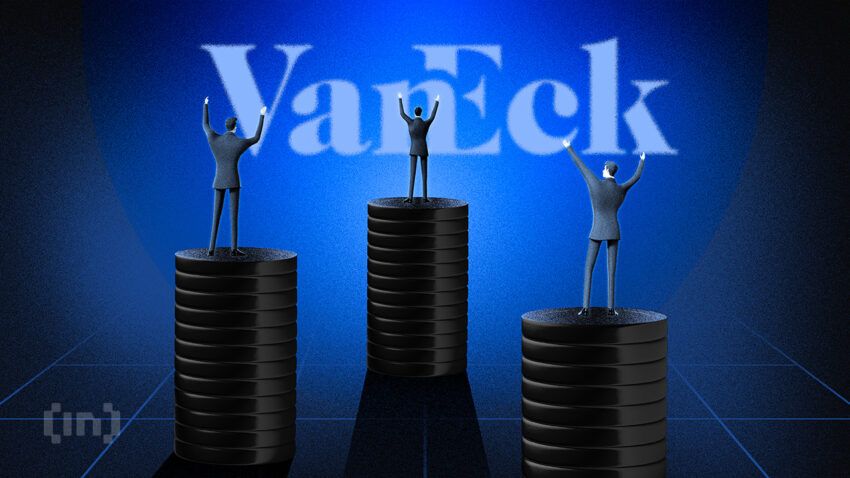Asset management giant VanEck has filed an 8-A form, signaling the final steps toward launching its spot Ethereum (ETH) exchange-traded fund (ETF).
In a separate but related development, the firm has decided to waive all fees for its upcoming spot Ethereum ETF. This strategy aims to attract a broad range of investors and solidify VanEck’s position in the competitive spot crypto ETF market.
VanEck’s 8-A Form Filing Sparks Spot Ethereum ETF Launch Speculations
On June 25, VanEck filed its 8-A form with the US Securities and Exchange Commission (SEC), a crucial step for companies aiming to register their securities. This form, officially known as the Registration of Certain Classes of Securities, is vital for entities listing securities on an exchange. It serves as a short-form registration statement under the Securities Exchange Act of 1934, enabling companies to offer their securities to the public.
Read more: Ethereum ETF Explained: What It Is and How It Works
The timing of VanEck’s 8-A filing has sparked discussions and speculation among the crypto community. Eric Balchunas, a senior ETF analyst at Bloomberg Intelligence, drew a parallel between VanEck’s Bitcoin (BTC) ETF 8-A filing.
“Should be noted that they filed their 8-A for spot Bitcoin [ETF] exactly 7 days before launch. Good sign for our July 2 over/under (7 days from now). But again, anything is possible. Sure, we’ll hear more soon,” Balchunas opined.
Simultaneously, the New York-based firm revealed that it will initially waive fees for its spot Ethereum ETF until 2025 or until the fund reaches $1.5 billion in assets. Matthew Sigel, VanEck’s Head of Digital Assets Research, shared more details about this decision.
“VanEck aims to be a leader on crypto ETF fees even if it means we lose money at the outset. […] The plan is to make it up on volume; in this case, decentralized finance volume. […] More on-chain activity = more ETH gas spent = ETH price higher = VanEck ETH bags up,” Sigel explained.
The ETF’s eventual fee of 0.20% is highly competitive, attracting significant investment quickly. This approach mirrors VanEck’s strategy with its spot Bitcoin ETF, which also included a fee waiver until the fund reached substantial assets.
Competitor Fee Strategies Intensify as VanEck, Franklin Templeton Reveal Costs
VanEck is not alone in the race to launch Ethereum ETFs. Franklin Templeton has previously disclosed a 0.19% fee for its Ethereum ETF. In an interview with BeInCrypto, Griffin Ardern, Head of Research & Options Desk at BloFin explained the strategy behind VanEck’s fees waiver.
“After an ETF product of a new asset is listed, there is usually a several-month “asset allocation period”. During this period, investors buy a large number of ETFs as part of their portfolio composition. For ETF providers, the main goal of the 0-fee strategy is to gain more users and AUM during the asset allocation period,” Ardern told BeInCrypto.
Experts such as Konstantin Boyko-Romanovsky, founder of Allnodes, believe these proactive fee disclosures might pressure other competitors to lower their fees.
“VanEck’s strategy to waive fees for its Ethereum ETF until 2025 or until the fund reaches $1.5 billion in assets can set a precedent that other ETF providers may need to follow suit, potentially leading to an industry-wide fee reduction. Competitors may need to reevaluate their fee structures to stay in the game or risk losing market share, especially among cost-sensitive institutional investors,” Boyko-Romanovsky told BeInCrypto.
Furthermore, Balchunas believes that BlackRock, the world’s largest asset manager might also lower its Ethereum ETF fees.
“Adds a touch of pressure on BlackRock to stay under 30 bps at least. So far, looks like ETH gonna be as low or even lower fees than BTC,” Balchunas noted.
Despite the fee wars, many see that the spot Ethereum ETF is less attractive, given that all potential issuers opt out of the staking aspects. Typically, Ethereum investors can stake their ETH holdings to earn extra yields. This gives them more benefits than only having spot exposure.
Read more: How to Invest in Ethereum ETFs?
Nonetheless, ETFs appeal to institutional investors by providing a regulated, convenient way to gain Ethereum exposure without direct ownership and staking complexities. Additionally, market experts and industry players believe that approving the spot Ethereum ETFs could pave the way for other crypto ETFs like Solana (SOL) to come. Eventually, this would lead to broader crypto adoptions in the mainstream.
Disclaimer
In adherence to the Trust Project guidelines, BeInCrypto is committed to unbiased, transparent reporting. This news article aims to provide accurate, timely information. However, readers are advised to verify facts independently and consult with a professional before making any decisions based on this content. Please note that our Terms and Conditions, Privacy Policy, and Disclaimers have been updated.


